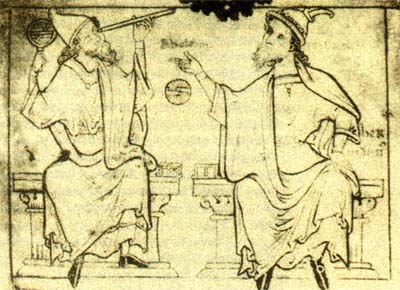
Hermannus Dalmata with an astrolabe in his hand shown with Euclid. Drawing from Chronica Maiora written by Matthew of Paris in the 13th c.
| DALMATIN, Herman (Dalmata, Hermannus; Sclavus, Secundus, De Carinthia), (around 1110, central Istria - after 1143), philosopher and translator. His education may have begun in a Benedictine monastic school. From 1130 to 1135 he studied at Cathedral schools in Chartres and Paris. After finishing his studies he set off, in the company of his friend Robert from Ketton, to the Near East, where they acquired a knowledge of Arabic science and philosophy. From 1138 to 1142 Herman and Robert stayed in Spain, at a certain centre by the river Ebro, and were engaged in translating activities. In 1138 Herman translated Fatidica (Prophetess), an astrological debate written by Sahl ibn Bishra, a scientist of Jewish origin. In 1140 having translated Introdictorium in astronomiam (An Introduction to Astronomy), a work by Abu Ma'Shar, he introduced Aristotelian teachings into western Europe. At the same time he wrote two astrological works Liber imbrium (A Book about Rains) and De indigatione cordis (On Research of Heart), which are compilations of Indian and Arabic texts. Around 1140 Dalmatin revised Adelard's translation of Euclid's Elements, and Adelard's translation of Astronomical Tables compiled by Muhamed ibn Musa al-Kwarizmi. Owing to Petrus Venerabilus (an abbot from Cluny), Herman in 1142 translated a number of rather short texts about Islam, namely De generatione Mahumet (About Muhammad's Birth) and Doctrina Mahumet (Muhammad's Doctrine). Collaborating with Robert he worked on the translation of Qur'an. These texts-translations played a prominent role in Christian Europe's gaining a knowledge about Islam. Having left Spain Herman went to Toulouse where in 1143 he translated Ptolemy's Planisphera (Planisphaerium), a work which was concerned with stereographic projection on a plane and which served as a theoretical background for the construction of the astrolabe in the Latin West in the Middle Ages. In the same year he went to Bezieres and there finished his main work De essentis (On Essences). In this work he laid down his natural philosophy, which was based on Aristotelian teachings (he got acquainted with via Abu Ma'shar's works) and Platonic teachings (of which he gained knowledge in Chartres) and supplemented with astrological concepts he had got familiar with in the Arabic texts. In his major work the five essences - cause (causa), movement (motus), time (tempus), location (locus) and relationship (habitudo) - play a vital role. The work is also important for Herman's views on astronomy. It is supposed that he might have written on the astrolabe, although that has not been proved. |  Hermannus Dalmata with an astrolabe in his hand shown with Euclid. Drawing from Chronica Maiora written by Matthew of Paris in the 13th c. |